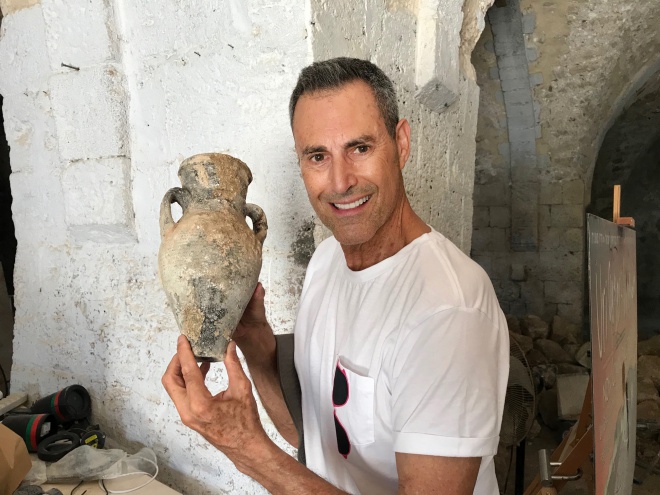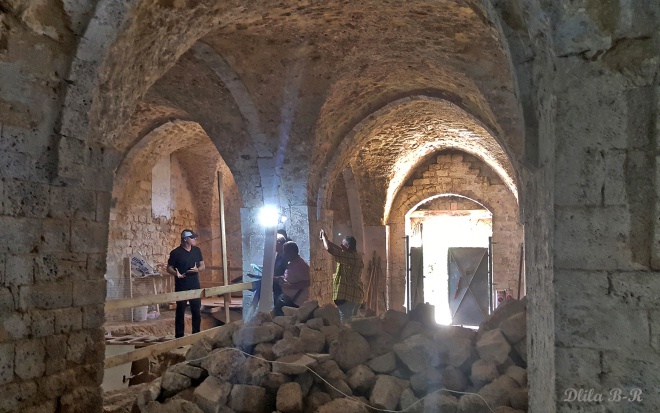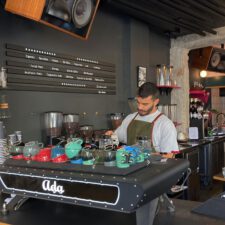 Mentalist Uri Geller is building a museum in the world’s most ancient port city, Jaffa. When they start digging, an ancient olive soap factory is unearthed. The impressive masbena – or soap-manufacturing factory – dates back to the nineteenth century was discovered along with several large underground chambers.
Mentalist Uri Geller is building a museum in the world’s most ancient port city, Jaffa. When they start digging, an ancient olive soap factory is unearthed. The impressive masbena – or soap-manufacturing factory – dates back to the nineteenth century was discovered along with several large underground chambers.
“Our work on the museum required, among other things, that we rewire the electricity in the ancient building,” Uri Geller recounts. “When the Electricity Company began working on the structure, in tandem with inspectors from the Israel Antiquities Authority, we were amazed to uncover a large chamber with moulded recesses. As the work proceeded, I noticed a pile of refuse on one side. I intuited that there was something hidden there. To the surprise of the Israel Antiquities Authority inspectors, an Exceptional find was revealed: a factory for making soap (masbaneh in Arabic, Masbena in Hebrew).”
The site was well preserved and included troughs for mixing raw materials for the soap, a large cauldron, a hearth, water cisterns and underground vaults that were used for storage.
The production of soap from olive oil in the Land of Israel is an industry that was recorded as far back as the tenth century. Soap became an important and lucrative product in Israel, starting out in the Middle Ages and continued as recently as the beginning of the last century. Some of the soap was sold locally, while a large share was destined for export to regions within the Ottoman Empire – mainly for the Egyptian market. Read more about the importance of olives here.

The production center was in Nablus, a town with abundant olive groves and where two traditional soap factories operate to this day. Soap was also manufactured on an industrial scale in Jaffa, Jerusalem, Gaza and Lod. In addition to this find, there is one other soap factory known of in Jaffa: the Damiani Family Masbena, which operated in a large vault beneath the Jaffa Museum. That factory, which was active until 1948, is closed to visitors today, but can be glimpsed from a vantage point on Mifratz Shlomo Street. It is interesting to note that both Jaffa soap factories have nearly identical equipment.
Look out for fake organic olive oil from Israel in this article here.
See soapmaking in Nablus today:
One of the explanations for the commercial success of the Land of Israel soap, compared to its European competitors, is in the raw material. European soap was made, inter alia, with pig fat – a substance shunned by Muslims and Jews – while in the Land of Israel other materials were used: The soap’s core ingredient was “kosher” olive fat, and to this was added soda ash derived from potash-rich saltwort plants, water and lime.
Artisans would oversee the apportioning, preparation and mixing of the ingredients, all of which culminated in them being cooked in large vats or cauldrons for seven to 10 days. Next, the liquid soap would be poured onto special, lime-covered surfaces, where it would cool down and solidify for another 10 days until it could be cut into bars onto which the factory seal would be embossed. These would be stacked up and left to dry out for another two months. Only then could the soap be wrapped in paper for sale.
The soap factory utensils will be put on display at the Uri Geller Museum when it opens at 7 Mazal Arieh Street.



